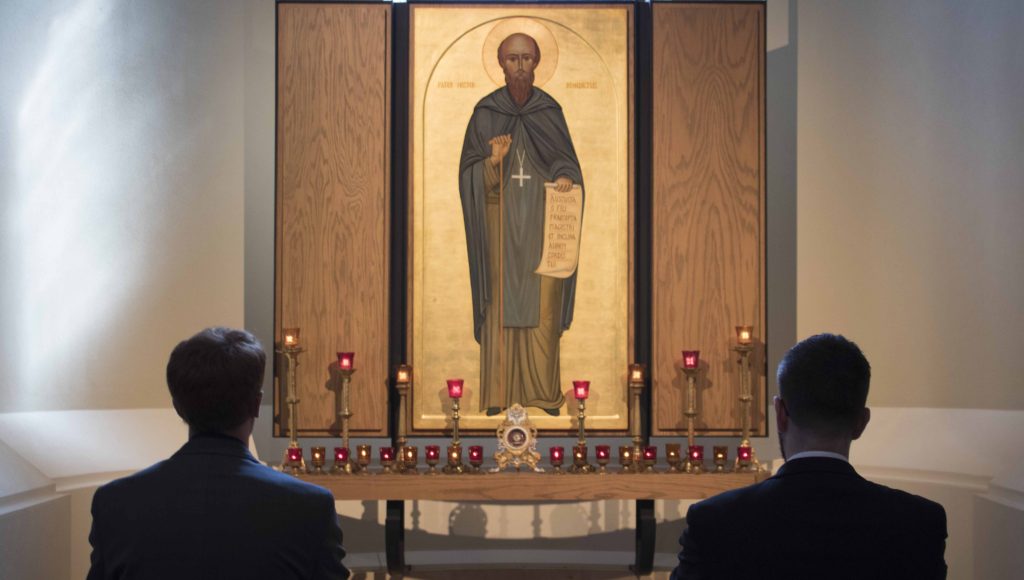
Abbot’s Homily: Passing of St. Benedict – 2017
This homily was given by Abbot Benedict Neenan, OSB, on 21 March 2017 in the Basilica of the Immaculate Conception, Conception Abbey.
Do you seek God? Do you want to grow closer to God? Do you want to pattern your life according to the way God wants you to live? Do you want to be truly happy with the joy and peace that only God can give?
If you do, you are not alone. In fact, history is full of people who have sought God. Our present time is full of people who seek God. This church today is full of people who seek God currently in their lives.
If this is true, and I believe it is, then we don’t have to look very far to find out how to go about this search for God. You already know many of the ways to search for God. You have looked for God and found him in the scriptures. You have looked for God and found Him in your Christian faith, in the sacraments of the Church, in the communities you are part of, in service to others, and in your love for other. You have looked for God and found Him in your vocation as a monk, as a priest, as a married person, as a single person, or as a seminarian.
St. Benedict searched for God just like you and me. And so we celebrate his feast because he helped so many others find God in ways that built on those tried and true methods found in scripture, the sacraments, and the life and teachings of Jesus Christ. He developed a “school for the Lord’s service” and laid down a method for all kinds of people to seek God: educated and uneducated, rich and poor, high strung and laid back, feisty and timid, strong and weak.
St. Benedict’s method for finding God is based on a few simple ideas, ideas that Jesus himself taught, and I would like to share them with you.
1. Prayer is central to our search for God.
St. Benedict’s first idea for his school is that prayer should be central to those who seek God. You can’t find God without spending time with Him, listening to Him and praising Him. The Church lays out various methods to do this: in her liturgies like the Eucharist and the Divine Office, in Eucharistic Adoration, lectio divina, the Holy Rosary, and just simply opening your heart and mind to God, giving Him praise and asking for His help and intercession.
2. Obedience to God’s will.
You can’t find God if you follow your only your own will. Through holy obedience, we overcome self-will and are able to follow the will of the Father who loves us. In monastic life, we live out our obedience as following the Rule of St. Benedict, our abbot, and our community. In our daily lives, we live out obedience by following the Church, the will of God, our families, and our responsibilities. Living a life of obedience leads to a true authentic freedom that can be found nowhere else.
3. The third idea that will help us to seek God is humility.
You can’t find God if you are too full of yourself. St. Benedict outlines the way to humility in chapter seven of his Rule. Here, St. Benedict reminds us that if we want to “reach the highest summit of humility, if we desire to attain speedily the exaltation in heaven to which we climb by the humility of this present life, then by our ascending actions we must set up that ladder on which Jacob in a dream saw angels descending and ascending (Gen 28:12).” We have to learn, by steps, that WE are not in charge of the world, or even ourselves, but that God is.
4. Finally, living a life of community can help us seek God.
We don’t find God alone, but with and through others. And, amazingly, it doesn’t have to be only those who are like us who like us. A monk finds God in each and all of his brother monks, especially the ones who are not so easy to live with. In the world, we find God in the people we interact with daily, our families and friends, those we work with, the stranger on the street. God calls us to love them, and through that love, we find God.
There are many ways to seek God, but they all go through Christ. I am grateful to have discovered this way of St. Benedict. A way that is ever ancient, yet ever new.
